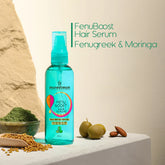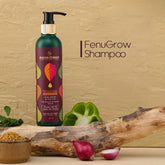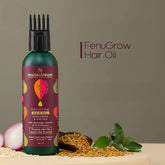Best Ayurvedic Hair Care Routine & Tips for Frizzy & Dry Hair

Social media influencers, with their kooky beauty regimens, have utterly screwed up people's heads and hair these days. Intrigued by the lifestyle and day-to-day routine of these 'beauty gurus,' many have begun to alter their personality, including their hair, in order to get those beautiful locks, causing major harm to their hair. As a result, your hair becomes dry, brittle, and frizzy.
What is the best way to treat this condition? Answer: Pick the best Ayurvedic Hair Care Routine. YES! Ayurvedic therapeutic and restoring powers aid in the revival of your natural hair texture. Here are the best Ayurvedic Hair Care Tips and Routines for Frizzy & Dry Hair.
But how does Ayurveda accomplish this? What effect does Ayurveda have on hair health? How can you tell whether your hair is dry or frizzy according to Ayurveda? Which Ayurvedic Hair Care Routine is Best for Frizzy and Dry Hair? Which Ayurvedic factors cause our hair to become dry and frizzy? Let's talk about it in more depth.
How to Determine if your Hair & Scalp is Dry or Frizzy?
On the second day after washing your hair, rub a tissue on your scalp to see whether it is greasy. If there is no oil blot on the tissue, you have dry hair and a dry scalp. Dry scalp and hair are caused by inert oil glands on the scalp and their lack of capacity to generate adequate sebum on the scalp. This problem is commonly preceded by dry scalp, split ends, and, finally, hair loss.
Which Ayurvedic factors cause our hair to become dry and frizzy?
As per Ayurveda, our body is composed of five elements namely- air, water, ether, fire, and earth. A combination of one or more of these elements constitutes the three Ayurvedic Doshas- Vata, Pitta, and Kapha. An imbalance in any of these Doshas leads to various conditions in our body affecting our physical, mental, and emotional health.
According to Ayurveda, an elevated Vata leads to dry or frizzy hair and scalp issues. And following a proper Ayurvedic Hair Care Routine will help you to pacify the Dosha imbalance and manage your frizzy hair. There can be various factors determining the aggravated Vata imbalance. Let us look at some of these factors in detail.
Factors Leading to Vata Imbalance
 |
Diet : This type of imbalance arises as a result of a poor diet and a lack of key nutrients for the body. As a consequence, your hair follicles are deprived of the nutrients required for renewal, resulting in inadequate sebum production in the scalp and finally dry hair and scalp. As a result, the hair gets thinner and becomes brittle, eventually leading to split ends and hair loss. Vata imbalance can also be caused by particular dietary supplements, such as processed foodstuffs, fried foods, or baked foods. These include urad dal, potatoes, cauliflower, cabbage, and many more. |
Age : Another element that contributes to Vata imbalance is age. Vata Dosha grows with age as well.
Weather : Summers are well-known for making your skin and hair dry. Summers are also believed to have high Vata levels. During this season, hair cuticles are prone to dryness because exposure to the sun drains away moisture, enhancing the Dosha levels.
Living Environment : Because air is the dominating element in the Vata Dosha, individuals who live in places with heavy winds are more prone to this type of imbalance. Furthermore, metropolitan lifestyles have a negative impact on Dosha levels.
Work Schedules : The Vata Kala is the period between 2 a.m. to 6 a.m. As a result, those who work night shifts suffer from this type of Dosha imbalance since their job schedules force them to work in Vata Kala. This induces a discrepancy in Dosha levels, resulting in dry or frizzy hair and split ends.
Heat Styling : Styling procedures such as blow-drying and straightening predispose the hair to dryness and breakage. The heat from these treatments depletes the hair's natural moisture, resulting in frizzy and dry hair.
Washing your hair with chemical-laden products : The market nowadays is flooded with products containing harmful chemicals like sulfates, parabens, and alcohol which strip away the natural oil from your hair making the scalp & hair dry.
Hair Care Routine & Tips for Frizzy And Dry Hair

1. Regular Hair Oiling is the key : Regularly massaging your scalp and hair with Ayurvedic oils that especially balance Vata dosha should be part of your Ayurvedic Hair Care Routine. Oils nourish your scalp, while massage increases blood circulation. Massage your scalp with Ayurvedic oils for around 15 minutes at least twice a week.
Ayurveda suggests applying hair oil and leaving it on overnight before washing your hair with herbal cleansers the next day. Here are a few Ayurvedic herbs that can help regulate exacerbated Vata dosha and, as a result, dry and frizzy hair.
a) Fenugreek : Fenugreek (methi) has several hair benefits and can successfully treat any hair concern. Some people believe that methi is the key to growing thick, healthy, and lustrous hair. Fenugreek has a lot of protein and amino acids, which help to restore hair shafts that have been damaged by dryness, heat styling, chemicals, UV damage, or color treatments. By Enhancing cuticle absorption in the hair shaft, Fenugreek helps stimulate healthier hair growth. It encompasses mucilaginous fiber, which absorbs a great deal of moisture. As a consequence, fenugreek helps to retain the moisture barrier in your hair strands, improving shine and imparting a softer texture.
b) Walnut : Walnuts, which are strong in potassium, omega-3, omega-6, and omega-9 fatty acids, help to keep your hair in place from root to tip. The omega 2 fatty acids in walnuts are also great for fortifying and strengthening your hair. It is one of the most popular scalp and hair oils due to its anti-fungal, anti-bacterial, and anti-inflammatory properties. It promotes hair growth and minimizes hair loss while also softening, strengthening, and thickening it. Walnut leaves have a high concentration of tannins and oils, both of which help to hydrate your hair and scalp.
c) Brahmi : It stimulates the hair roots, allowing for the emergence of luscious locks. Brahmi is a traditional Ayurvedic herb that aids in the weakening of hair follicles, which leads to hair loss. Brahmi oil contains an alkaloid that triggers a protein in your body, causing your hair to naturally toughen and strengthen. It also helps to cure dry and damaged scalp. Brahmi reduces the stress hormone cortisol in your body, which is one of the reasons for hair loss. Brahmi oil nourishes and moisturizes your hair, keeping it from breaking. It also helps to build blood vessels, allowing oxygen and nutrients to reach the scalp and promote hair development while preventing hair loss.
d) Almond Oil : This herb contains nutrients such as omega-3 fatty acids, vitamin E, magnesium, and phospholipids. Almond oil both nourishes and strengthens your hair. Because of its high nutritional content, it is one of the best ingredients for healing damaged hair and has been used in Ayurvedic medicine for centuries to treat dry scalp and improve overall circulation flow, providing your hair with a robust dose of antioxidants. These not only make your hair shinier and stronger, but they also make it less prone to breakage and split ends.
e) Olive Oil : Antioxidants, as well as vitamins E and A, are abundant in olive oil. These nutrients are useful for restoring damaged hair, specially treated and colored hair that is nutritionally weak. It guards against cell damage while also nourishing and conditioning the hair to improve its quality. This will help to keep the moisture in and the frizz at bay. The scalp is hydrated and moisturized with olive oil. It reduces scalp dryness, which aids in the control of dandruff and hair loss. It reduces irritation and infections, leading to a healthier scalp and roots.
f) Wash your hair with Ayurvedic Shampoo : Next step in Ayurvedic Hair Care Routine is to remove the dirt and grime, by using a mild shampoo. In general, market shampoos include hazardous ingredients such as sulphates and parabens. Using these products on your hair will have an effect on your health. Instead, choose ayurvedic shampoos infused with nourishing botanicals like Fenugreek, Walnut, Amla, Shikakai, and Henna, which can help restore vitality and bounce to your tresses.
2. Repair your hair with Ayurvedic Conditioners : The Final Step in your Ayurvedic Hair Care Routine is treating your hair with ayurvedic hair conditioning. After cleansing your scalp and hair with an ayurvedic shampoo, use an ayurvedic conditioner that is free of harmful chemicals like sulphates and parabens. Fenugreek, Walnut, Neem, Tulsi, and Brahmi are examples of botanicals that help balance Vata Doshas. These conditioners nurture and pamper the scalp and hairs with Ayurvedic goodness, leaving them strong and silky.
3. Improve your dietary habits : Try to incorporate the following food supplements into your daily routine to help pacify the Vata imbalance.
a) Fruits : Apples, Apricots, Avocados, Bananas, Cherries, Berries, Coconut, Plums, Figs, Pineapples, Grapes, Peaches, Mangoes, Papayas, Oranges, Melons.
b) Vegetables : Asparagus, Celery, Carrots, Garlic, Onions (only steamed), Radish, Red Beets, Sprouts (low quantities), Sweet Potatoes, Spinach (low quantities), Tomatoes (low quantities) - all cooked. Note: Do not intake raw vegetables.
c) Nuts and seeds : In high quantities: Almond. In low quantities: Cashews, Pista, Pecan, Sesame seeds, Pumpkin seeds, Sunflower seeds, and any other nuts. Avoid Peanuts.
d) Grains : Wheat, Brown rice, Oats (boiled)
Vata requires consistency to maintain its pattern. Hot, fresh meals consumed at regular intervals throughout the day are a guaranteed method to maintain Vata balance and excellent hair days.
Changes in Lifestyle :
- Try to remain in regions that are warm and humid, since this might be the most pleasant setting for Vata-dominant persons. Also, work in air-conditioned rooms as little as possible.
- Avoid using hot water to wash your hair. You can use lukewarm water instead.
- Avoid utilizing heat styling techniques and use chemical-free hair products.
- When you go out in the sun, cover your hair with a hat or scarf.
While dry and frizzy hair may be symptoms, Ayurveda treats the root problem (Vata aggravation) that causes the disease. Ayurveda, via potent topical formulations as well as holistic food and lifestyle suggestions, helps you to fully harness your inherent healing ability by keeping your Doshas in balance.





